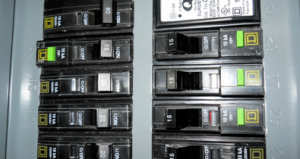
When your circuit breaker keeps turning off or “trips”, do you know what causes that?
A circuit breaker “trips” or shuts off the electrical flow to protect the circuit from overheating and causing damage, even possibly an electrical fire.
There are three things that typically cause a circuit breaker to trip:
- Circuit Overload – The circuit overloading is the most common reason your circuit breaker is tripping. That means you’re running too many heavy power consuming devices at the same time on the same circuit. Another cause of an overloaded circuit is an overheating appliance. It pulls in more amps than normal, causing the circuit to overload. An overheating central air conditioner is notorious for this during the summer.
- Short Circuit – The next possible (and more dangerous) cause is a short circuit. A short circuit happens when a “hot” wire (black) touches another hot wire or touches a “neutral” wire (white) in one of your outlets. When these two wires touch, a large amount of current flows, creating more heat than the circuit can handle, so it shuts off. You can tell if there was a short circuit by checking your outlets and plugs for the smell of burning, or brown/black discoloration. These wires can cross for multiple reasons, but it could be as simple as a loose connection or improper wiring.
- Ground Fault –Similar to a short circuit. A ground fault happens when a hot wire (black) touches the ground wire (bare copper) on the side of a metal outlet box which is connected to the ground wire. Just like a short circuit, you need to see if anything looks out of the ordinary with your outlets.
Need help?
Our number one recommendation with electricity is to call us and have a highly trained and knowledgeable electrician visit your home to make these determinations for you…safety first, always! If you are looking for a professional commercial electrical contractor in the North Atlanta Metro area, please call 678-895-2775 or complete our online request form.
